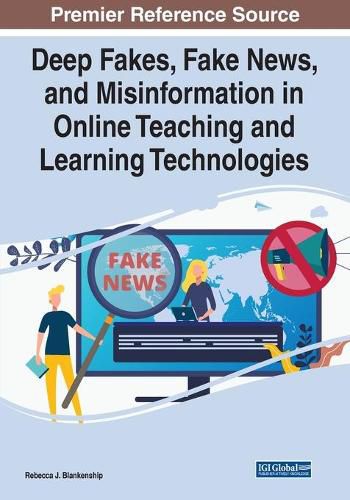Readings Newsletter
Become a Readings Member to make your shopping experience even easier.
Sign in or sign up for free!
You’re not far away from qualifying for FREE standard shipping within Australia
You’ve qualified for FREE standard shipping within Australia
The cart is loading…






This title is printed to order. This book may have been self-published. If so, we cannot guarantee the quality of the content. In the main most books will have gone through the editing process however some may not. We therefore suggest that you be aware of this before ordering this book. If in doubt check either the author or publisher’s details as we are unable to accept any returns unless they are faulty. Please contact us if you have any questions.
Choosing the right technologies to match student learning outcomes in today’s technology-integrated classrooms presents educators and instructional designers with multiple curricula and instructional design challenges including selecting appropriate technologies to match desired student learning outcomes. As students continue to have broad access to information from a variety of web-based platforms, educators and educational professionals are increasingly tasked with ensuring the information used to complete key assignments or tasks is authentic and from a verifiable resource. As such, the era of deep fakes in images, audios, videos, and digital texts is more prevalent than ever as numerous programs using artificial intelligence (AI) can significantly alter original content to fundamentally change the intent of original content. Moreover, students are being bombarded by a plethora of information that is either intentionally or mistakenly false and must be navigated with care. Accordingly, educators and educational professionals are now tasked with employing best practices to not only teach basic digital literacy and citizenship skills but also to recognize how technology-immersed learning environments interact with deep fakes and misinformation while equipping students with the tools necessary to recognize authentic and altered content.
Deep Fakes, Fake News, and Misinformation in Online Teaching and Learning Technologies is a critical reference source that addresses rising concerns of students’ ability to navigate the multitude of false and altered information and content that is easily accessible through online platforms. The chapters go into deeper detail about how deep fakes, fake news, and mis- and dis-information have the potential of negatively affecting the fields of teaching and learning and the importance of student access to content-related tasks from legitimate, vetted resources that accurately reflect the desired information the student means to convey. The book seeks to reinforce the importance of digital literacy and digital citizenship among adolescents. This book is essential for teaching faculty, higher education faculty, higher education administrators, educational software developers, security specialists, information specialists, media specialists, librarians, educational researchers, and students looking for information on how deep fakes and fake news are being navigated within the context of online teaching and educational technologies.
$9.00 standard shipping within Australia
FREE standard shipping within Australia for orders over $100.00
Express & International shipping calculated at checkout
This title is printed to order. This book may have been self-published. If so, we cannot guarantee the quality of the content. In the main most books will have gone through the editing process however some may not. We therefore suggest that you be aware of this before ordering this book. If in doubt check either the author or publisher’s details as we are unable to accept any returns unless they are faulty. Please contact us if you have any questions.
Choosing the right technologies to match student learning outcomes in today’s technology-integrated classrooms presents educators and instructional designers with multiple curricula and instructional design challenges including selecting appropriate technologies to match desired student learning outcomes. As students continue to have broad access to information from a variety of web-based platforms, educators and educational professionals are increasingly tasked with ensuring the information used to complete key assignments or tasks is authentic and from a verifiable resource. As such, the era of deep fakes in images, audios, videos, and digital texts is more prevalent than ever as numerous programs using artificial intelligence (AI) can significantly alter original content to fundamentally change the intent of original content. Moreover, students are being bombarded by a plethora of information that is either intentionally or mistakenly false and must be navigated with care. Accordingly, educators and educational professionals are now tasked with employing best practices to not only teach basic digital literacy and citizenship skills but also to recognize how technology-immersed learning environments interact with deep fakes and misinformation while equipping students with the tools necessary to recognize authentic and altered content.
Deep Fakes, Fake News, and Misinformation in Online Teaching and Learning Technologies is a critical reference source that addresses rising concerns of students’ ability to navigate the multitude of false and altered information and content that is easily accessible through online platforms. The chapters go into deeper detail about how deep fakes, fake news, and mis- and dis-information have the potential of negatively affecting the fields of teaching and learning and the importance of student access to content-related tasks from legitimate, vetted resources that accurately reflect the desired information the student means to convey. The book seeks to reinforce the importance of digital literacy and digital citizenship among adolescents. This book is essential for teaching faculty, higher education faculty, higher education administrators, educational software developers, security specialists, information specialists, media specialists, librarians, educational researchers, and students looking for information on how deep fakes and fake news are being navigated within the context of online teaching and educational technologies.